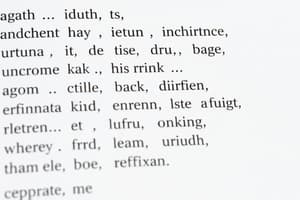Podcast
Questions and Answers
What is the term used to describe words that have opposite meanings?
What is the term used to describe words that have opposite meanings?
- Homophones
- Homonyms
- Synonyms
- Antonyms (correct)
What type of antonym has absolute opposite meanings?
What type of antonym has absolute opposite meanings?
- Gradable antonyms
- Complementary antonyms (correct)
- Relational antonyms
- Perfect antonyms
What is the importance of antonyms in language?
What is the importance of antonyms in language?
- They provide alternative ways to express ideas
- They create contrast and highlight differences (correct)
- They are used to create synonyms
- They add complexity to language
What type of synonym has identical meanings?
What type of synonym has identical meanings?
What is the advantage of using synonyms in language?
What is the advantage of using synonyms in language?
What is the term used to describe the relationship between words with contrasting meanings?
What is the term used to describe the relationship between words with contrasting meanings?
Which type of antonyms has a range of opposites with many degrees in between?
Which type of antonyms has a range of opposites with many degrees in between?
What is an example of relational antonyms?
What is an example of relational antonyms?
What is the purpose of using opposite words in language?
What is the purpose of using opposite words in language?
What should you consider when choosing opposite words?
What should you consider when choosing opposite words?
What is the result of using opposite words in language?
What is the result of using opposite words in language?
Flashcards are hidden until you start studying
Study Notes
Opposite Words
Antonyms
- Definition: Words that have opposite meanings
- Examples:
- Happy - Unhappy
- Hot - Cold
- Fast - Slow
- Types of antonyms:
- Gradable antonyms: Words with opposite intensities (e.g. hot - cold)
- Complementary antonyms: Words with absolute opposite meanings (e.g. alive - dead)
- Relational antonyms: Words with opposite relationships (e.g. husband - wife)
- Importance: Antonyms help to create contrast and highlight differences in language
Synonyms
- Definition: Words with similar meanings
- Examples:
- Big - Large - Huge
- Happy - Joyful - Cheerful
- Run - Sprint - Dash
- Types of synonyms:
- Perfect synonyms: Words with identical meanings (e.g. big - large)
- Near synonyms: Words with similar but not identical meanings (e.g. happy - joyful)
- Importance: Synonyms provide alternative ways to express ideas and add variety to language
Opposite Words
- Antonyms are words that have opposite meanings, such as Happy - Unhappy, Hot - Cold, and Fast - Slow.
- There are three types of antonyms:
- Gradable antonyms, which are words with opposite intensities, such as hot - cold.
- Complementary antonyms, which are words with absolute opposite meanings, such as alive - dead.
- Relational antonyms, which are words with opposite relationships, such as husband - wife.
- Antonyms are important because they help to create contrast and highlight differences in language.
Similar Words
- Synonyms are words with similar meanings, such as Big - Large - Huge, Happy - Joyful - Cheerful, and Run - Sprint - Dash.
- There are two types of synonyms:
- Perfect synonyms, which are words with identical meanings, such as big - large.
- Near synonyms, which are words with similar but not identical meanings, such as happy - joyful.
- Synonyms are important because they provide alternative ways to express ideas and add variety to language.
Definition of Opposite Words
- Opposite words, also known as antonyms, have contrasting meanings to describe a relationship between two words.
Characteristics of Opposite Words
- Can have a range of opposites (gradable antonyms)
- Can be absolute opposites with no middle ground (complementary antonyms)
- Can be opposite in relation to each other (relational antonyms)
Examples of Opposite Words
- Big vs Small
- Happy vs Sad
- Fast vs Slow
- Hot vs Cold
- Light vs Dark
- Old vs New
- Same vs Different
- Full vs Empty
Importance of Opposite Words in Language
- Clarify meaning and provide contrast
- Create nuanced and detailed descriptions
- Convey subtle differences in meaning and shade
Effective Use of Opposite Words
- Create contrast and emphasize differences
- Choose the correct type of opposite word based on context
- Be aware of connotations and shades of meaning associated with opposite words
Studying That Suits You
Use AI to generate personalized quizzes and flashcards to suit your learning preferences.




